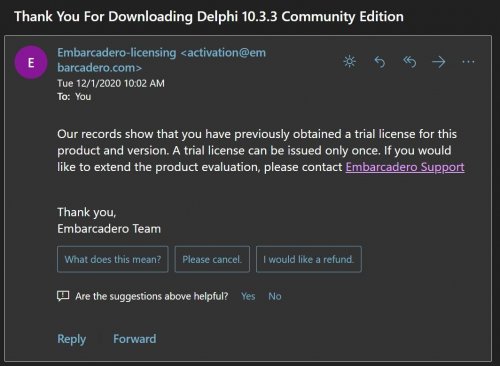-
Content Count
439 -
Joined
-
Last visited
-
Days Won
8
Posts posted by Kryvich
-
-
If a single-exe project is some command line utility, which is called very often, the size matters. I'd prefer if RTTI will be disabled by default, and it could be enabled for types where it really needed.
-
I would like to have a compiler option to disable modern RTTI throughout the application, including the linked standard library. Glad to hear that you managed to disable this information in your project.
-
 1
1
-
-
According to the probability theory, there is a 1/19 770 609 664 chance that on the next try you will get the desired 6-letter word. So the fact that after 400 billion attempts it has not been received looks suspicious, but not impossible. (19 770 609 664 = 52*52*52*52*52*52).
By the way, here are the probabilities of finding a word with fewer characters:
1-letter word: 1/52,
2-letter word: 1/2 704,
3-letter word: 1/140 608,
4-letter word: 1/7 311 616,
5-letter word: 1/380 204 032,
6-letter word: 1/19 770 609 664.
-
 1
1
-
-
@emailx45 Yes, I can reproduce in VirtualBox 6.1 with Windows 10 and Delphi 10.4.2 installed.
Error: Invalid Class Typecast. Details:
Quote[21386672]{vclide270.bpl} GDIPlus.GradientTabs.TGradientButton.FormDPI (Line 358, "GDIPlus.GradientTabs.pas" + 1) + $F
[5005A496]{rtl270.bpl } System.ErrorAt (Line 5781, "System.pas" + 3) + $4
[5005FFD3]{rtl270.bpl } System.@AsClass (Line 18460, "System.pas" + 3) + $5
[21386672]{vclide270.bpl} GDIPlus.GradientTabs.TGradientButton.FormDPI (Line 358, "GDIPlus.GradientTabs.pas" + 1) + $F
[21386BC6]{vclide270.bpl} GDIPlus.GradientTabs.TScrollerButton.PaintLeftArrow (Line 520, "GDIPlus.GradientTabs.pas" + 3) + $2
[21386B85]{vclide270.bpl} GDIPlus.GradientTabs.TScrollerButton.Paint (Line 508, "GDIPlus.GradientTabs.pas" + 3) + $2
[50D01E19]{vcl270.bpl } Vcl.Controls.TGraphicControl.WMPaint (Line 14009, "Vcl.Controls.pas" + 7) + $5
[50CF7172]{vcl270.bpl } Vcl.Controls.TControl.WndProc (Line 7480, "Vcl.Controls.pas" + 91) + $6
[50CF6DAC]{vcl270.bpl } Vcl.Controls.TControl.Perform (Line 7258, "Vcl.Controls.pas" + 10) + $8
[50CFC56E]{vcl270.bpl } Vcl.Controls.TWinControl.PaintControls (Line 10582, "Vcl.Controls.pas" + 27) + $D
[50CFC36B]{vcl270.bpl } Vcl.Controls.TWinControl.PaintHandler (Line 10528, "Vcl.Controls.pas" + 24) + $8
[50CFCBF4]{vcl270.bpl } Vcl.Controls.TWinControl.WMPaint (Line 10711, "Vcl.Controls.pas" + 6) + $5
[50D02BC1]{vcl270.bpl } Vcl.Controls.TCustomControl.WMPaint (Line 14385, "Vcl.Controls.pas" + 2) + $4
[50CF7172]{vcl270.bpl } Vcl.Controls.TControl.WndProc (Line 7480, "Vcl.Controls.pas" + 91) + $6
[50CF8C36]{vcl270.bpl } Vcl.Controls.TControl.GetStyleName (Line 8510, "Vcl.Controls.pas" + 1) + $8
[50CF8C56]{vcl270.bpl } Vcl.Controls.TControl.GetStyleName (Line 8512, "Vcl.Controls.pas" + 3) + $7
[5005A240]{rtl270.bpl } System.@GetMem (Line 4843, "System.pas" + 20) + $0
[50061E56]{rtl270.bpl } System.@NewUnicodeString (Line 25659, "System.pas" + 10) + $0
[500622F1]{rtl270.bpl } System.@UStrAsg (Line 26649, "System.pas" + 19) + $0
[5005A25C]{rtl270.bpl } System.@FreeMem (Line 4891, "System.pas" + 20) + $0
[50061F75]{rtl270.bpl } System.@UStrArrayClr (Line 26028, "System.pas" + 16) + $0
[50CF8D13]{vcl270.bpl } Vcl.Controls.TControl.IsCustomStyleActive (Line 8526, "Vcl.Controls.pas" + 😎 + $15
[50CFC0C7]{vcl270.bpl } Vcl.Controls.TWinControl.WndProc (Line 10424, "Vcl.Controls.pas" + 169) + $6
[50CFB614]{vcl270.bpl } Vcl.Controls.TWinControl.MainWndProc (Line 10113, "Vcl.Controls.pas" + 3) + $6
[501826A4]{rtl270.bpl } System.Classes.StdWndProc (Line 18175, "System.Classes.pas" + 😎 + $0
[50E5C233]{vcl270.bpl } Vcl.Forms.TApplication.ProcessMessage (Line 11028, "Vcl.Forms.pas" + 23) + $1
[50E5C276]{vcl270.bpl } Vcl.Forms.TApplication.HandleMessage (Line 11058, "Vcl.Forms.pas" + 1) + $4
[50E5C5AD]{vcl270.bpl } Vcl.Forms.TApplication.Run (Line 11196, "Vcl.Forms.pas" + 26) + $3
[00524DB8]{bds.exe } bds.bds (Line 222, "" + 13) + $2Though I never used this view in modern IDEs. Palette Tool window is more convenient on modern wide displays.
-
Of course, there are such groups.
-
 1
1
-
-
-
For those who are interested, this book has been translated into Russian:
-
-
32 minutes ago, Vincent Parrett said:converting thousands of images to svg
I believe some type of neural network may be used for this purpose.
-
For High DPI support you should consider SVG.
-
I confirm that the problem has been resolved. I got a new key and another 367 days on CE license, though still 10.3.3, not 10.4.
-
Last time the license for Delphi 10.3 CE expired, they did not renew it, but offered a new license for Delphi 10.3.3 Rio CE. Let's see what they will do this time. Hopefully, they will offer a new 10.4.x license as a Christmas present. 🙂
-
My last trial license was RAD Studio XE3 Architect Trial.
-
-
I don't get this:
{$B-} // avoid multiple conditional jumps by not using short eval
Actually $B- disables the complete Boolean evaluation. It's a default setting, and it gets a best result in this case.
-
I have clear.cmd file in my project folders to remove any temporary files, which contains the command:
del /f /s *.~* *.bak *.dcu *.identcache *.local *.map *.drc *.cbk *.stat *.tds
-
-
-
const STX=#$02;
isn't the same as
const STX='#$02';
-
 2
2
-
-
So instead of "DLL not found" you got "External Exception". This is about how important it is to name exceptions correctly and clearly.
-
 1
1
-
-
packed record
> fillchar( MyData, Sizeof(TMyData) , 0 );
MyData := Default(TMyData);
-
Have you seen QuickJS Javascript Engine: https://bellard.org/quickjs/
The author claims almost complete ES2020 support.
-
Where do you store reference variables for the tables? I.e. table1, table2 etc.
-
Just a remark: I saw the reverse picture when my Win32 application in the Windows XP VirtualBox was running one and a half times faster than in the Windows 10 host machine...
![Delphi-PRAXiS [en]](https://en.delphipraxis.net/uploads/monthly_2018_12/logo.png.be76d93fcd709295cb24de51900e5888.png)






Install recent Delphi versions on Windows XP
in Delphi IDE and APIs
Posted
I was able to install the 10.3 Community Edition on Windows XP, but it refused to work.